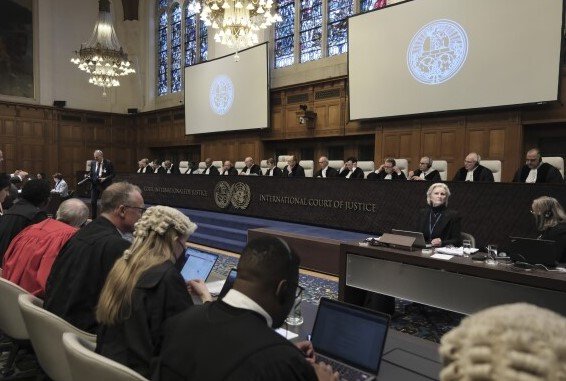Latin America’s largest country says “moral ambiguity” is no longer an option as Gaza war draws global legal scrutiny
Brazil has announced its intention to formally intervene in South Africa’s case at the International Court of Justice accusing Israel of genocide in Gaza, intensifying international legal pressure on the Netanyahu government.
The move, revealed on Wednesday by Brazil’s Foreign Ministry, marks one of the strongest rebukes of Israel’s conduct by a G20 nation and reflects growing frustration among non-Western states over the war’s human toll.
Brazil Speaks Out Loud and Clear
“The international community cannot remain inactive,” the ministry said in a firm statement. “There is no longer room for moral ambiguity or political omission.”
That tone — stark, direct, and very un-diplomatic — is turning heads across global capitals. For Brasília, a country long cautious about global interventions, this signals a major policy shift. And it puts President Luiz Inácio Lula da Silva right back into the geopolitical spotlight.
The intervention isn’t a surprise, per se. Brazil has been publicly critical of Israel’s military campaign since early this year. What’s new is the legal weight now being thrown behind those words. The ICJ case, originally filed by South Africa in December, is already the most high-profile genocide trial in a generation.

What the ICJ Case Actually Is
So what’s this case about?
South Africa’s complaint accuses Israel of violating the 1948 Genocide Convention during its ongoing war in Gaza — a claim Israel strongly denies. The ICJ has held multiple hearings, including emergency ones, and issued provisional measures calling on Israel to prevent civilian harm.
Brazil is preparing to file a formal intervention under Article 63 of the ICJ statute. This allows third-party states to weigh in on legal interpretations in a case that involves international treaties they’re signatory to — like the Genocide Convention.
Here’s why that matters:
-
It increases the political legitimacy of the original case.
-
It shows global division over how the war is viewed.
-
It drags Brazil further into one of the most polarized legal fights in recent UN history.
Lula’s Foreign Policy, Rewired
Lula has always styled himself as a champion of the Global South. But his administration’s posture this year has gone from symbolic gestures to hard legal action.
Brazil recalled its ambassador to Israel in May. It also hosted high-level Palestinian delegations in June. Now it’s becoming the first Latin American country to legally align with South Africa at the ICJ.
That’s not just moral posturing. It’s diplomatic theater — with real consequences.
One senior Itamaraty (Brazil’s foreign ministry) official told Folha de S.Paulo, “We’re watching a humanitarian collapse. There’s a legal duty now, not just a political one.”
Reactions: Applause and Alarm
Reactions have been swift — and mixed.
Pro-Palestinian groups in Brazil welcomed the move as overdue. “This restores Brazil’s credibility as a peace advocate,” said Samira Chaud, a São Paulo-based activist.
But Israeli officials were less than thrilled. A government spokesperson accused Brazil of “parroting propaganda from radical states” and said the ICJ case had “no legal or factual basis.”
Even within Brazil, voices are split. Some conservative lawmakers criticized Lula’s foreign ministry for “playing judge in a conflict where Brazil has no real role.”
Still, the international reaction suggests Brasília’s intervention won’t be isolated.
Who Else May Join In?
Brazil could be the first of many.
Other non-Western countries — particularly in Latin America and Africa — are reportedly weighing similar interventions. Bolivia and Algeria have expressed support for South Africa’s case. Malaysia has hinted at a possible filing. Indonesia is actively reviewing the court documents.
The Netherlands, a founding member of the Genocide Convention, said last week it respects the ICJ’s role but would not intervene at this stage.
Here’s a current snapshot of who’s where:
| Country | Position on ICJ Case | Filed Intervention |
|---|---|---|
| South Africa | Original complainant | Yes |
| Brazil | Supportive, preparing legal filing | In final stages |
| Algeria | Supportive | No |
| Bolivia | Supportive | No |
| Germany | Opposed | No |
| Netherlands | Neutral | No |
| United States | Opposed | No |
| Malaysia | Supportive | Reviewing |
From Jabalia to The Hague
On the ground in Gaza, little of this legal wrangling matters to residents of Jabalia, Khan Younis, or Rafah — where basic infrastructure remains gutted and international aid trickles in under fire.
But symbolically, the ICJ’s growing docket does something important: it brings global legal eyes to a conflict where diplomatic solutions have failed. And Brazil’s voice, representing over 200 million people, adds volume to a chorus demanding accountability.
On Tuesday, images circulated online of hundreds of Gazans walking barefoot along al-Rashid Street in Jabalia after receiving food aid — a haunting reminder of why this case matters to so many.
What’s Next at The Hague?
Brazil’s legal team is reportedly finalizing documentation this week. Once filed, its intervention will become public and open to reply. The ICJ does not issue criminal verdicts, but its rulings can influence UN policy, sanctions, and international diplomacy.
A final ruling on the genocide claim could take years. But these interventions? They’re shaping the debate now.
